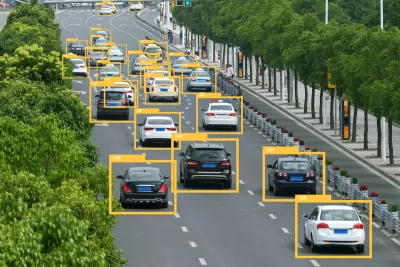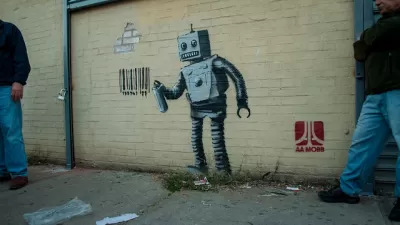AI could automate many urban systems, but that may not mean it’s a good idea.

In an opinion piece in The Conversation, Federico Cugurullo cautions against letting artificial intelligence take too much control of our cities. As Cugurullo explains, the emerging field of AI urbanism differs from ‘smart cities’ that use data to manage urban services. “AI urbanism represents a new way of shaping and governing cities, by means of artificial intelligence (AI). It departs substantially from contemporary models of urban development and management.”
In other words, “AI urbanism does not simply quantify, it tells stories, explaining why and how certain events take place.” Yet, “as the recent example of ChatGPT has made clear, AI can produce a detailed account, without grasping its meaning.”
AI systems bring us closer to sci-fi worlds in which, for example, technology predicts where crime might happen. “This might save our city managers some time, given AI’s extraordinary velocity in analysing large volumes of data, but the price that we are paying in terms of social justice is enormous.”
Some drawbacks to AI pointed out by Cugurullo include its voracious energy consumption and demonstrated discrimination in housing and real estate that perpetuates historical patterns. Meanwhile, the more autonomous we make cities, the less control we have, Cugurullo claims.
“As the autonomy of AI grows, ours decreases and the rise of autonomous cities risks severely undermining our role in urban governance. A city run not by humans but by AIs would challenge the autonomy of human stakeholders, as it would also challenge many people’s wellbeing.”
FULL STORY: AI could make cities autonomous, but that doesn’t mean we should let it happen

Alabama: Trump Terminates Settlements for Black Communities Harmed By Raw Sewage
Trump deemed the landmark civil rights agreement “illegal DEI and environmental justice policy.”

Study: Maui’s Plan to Convert Vacation Rentals to Long-Term Housing Could Cause Nearly $1 Billion Economic Loss
The plan would reduce visitor accommodation by 25% resulting in 1,900 jobs lost.

Why Should We Subsidize Public Transportation?
Many public transit agencies face financial stress due to rising costs, declining fare revenue, and declining subsidies. Transit advocates must provide a strong business case for increasing public transit funding.

Wind Energy on the Rise Despite Federal Policy Reversal
The Trump administration is revoking federal support for renewable energy, but demand for new projects continues unabated.

Passengers Flock to Caltrain After Electrification
The new electric trains are running faster and more reliably, leading to strong ridership growth on the Bay Area rail system.

Texas Churches Rally Behind ‘Yes in God’s Back Yard’ Legislation
Religious leaders want the state to reduce zoning regulations to streamline leasing church-owned land to housing developers.
Urban Design for Planners 1: Software Tools
This six-course series explores essential urban design concepts using open source software and equips planners with the tools they need to participate fully in the urban design process.
Planning for Universal Design
Learn the tools for implementing Universal Design in planning regulations.
Caltrans
Smith Gee Studio
Institute for Housing and Urban Development Studies (IHS)
City of Grandview
Harvard GSD Executive Education
Toledo-Lucas County Plan Commissions
Salt Lake City
NYU Wagner Graduate School of Public Service





























